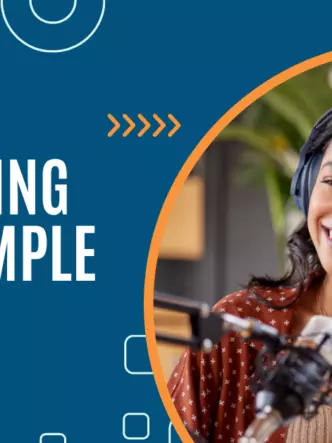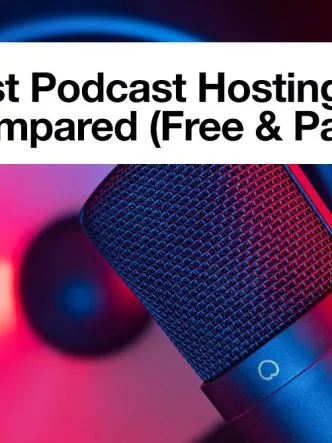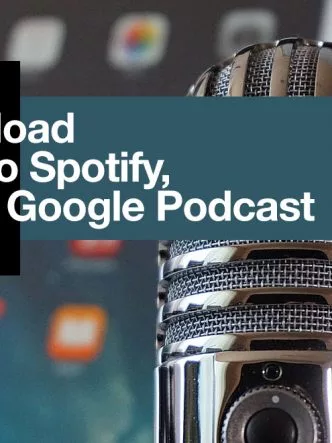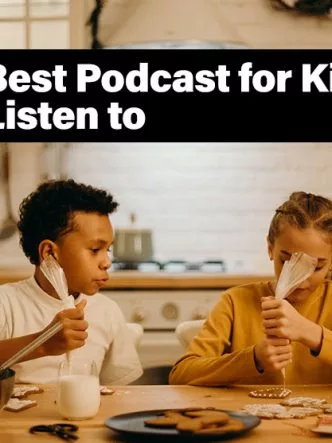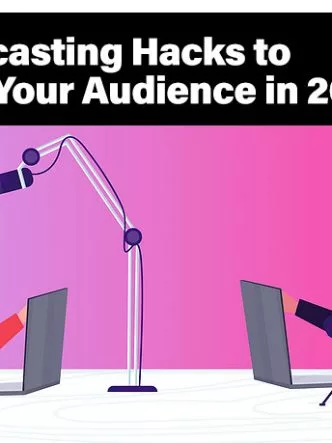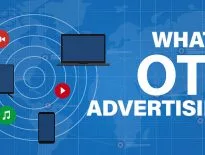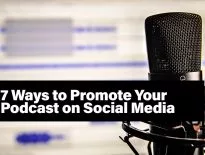Podcasts are quickly gaining in popularity. Find out which platforms and devices are best-suited to the medium.

For many years, brands and content creators dismissed podcasts in favor of video. Audio-only content was considered old-fashioned and unfit for the modern consumer.
Flash forward to today. Nothing could be further from the truth. Podcasts have been surging in popularity for years, with new listeners and new content creators signing up constantly.
Although podcasting technology isn’t new – the very first podcasts came online in 2004 – it has taken some time to truly build up steam. Now, podcasters like Joe Rogan have become household names. Others, like Barack Obama and Bruce Springsteen, were household names already.
Unsurprisingly, new users who want to tune into popular podcasts have more options than ever. Finding new free podcasts online is easy, but every device and podcasting app is a little different. Here are some of the most popular ways people are tuning in today.
Listen to Podcast On iPhone
Apple provides the easiest entry point to podcast content for its users. All iPhones, iPads, and Apple Watches come with a built-in podcast listening app called Podcasts. You’ll find the purple icon right on your home screen.

Apple understood early on that music and podcasts are two entirely different things. When it spun the Podcast app off of iTunes in the late 2000s, many other tech companies followed suit.
Apple’s built-in podcast app offers access to more than 1 million different shows, with 30 million episodes available in total. Subscribing to new shows is free, and you can listen to your favorite podcasts on any Apple device.
There is a chance your iPhone’s podcast app doesn’t have the specific podcast you’re looking for. Some podcasts are only available through paid streaming platforms like Spotify. If that’s the case, you will have to download the iOS app and subscribe to a paid service before accessing your podcast.
Listen to Podcast On Android
Android phones vary widely in terms of features and compatibility. Most Android phones come with a built-in podcast app. Some do not. If you aren’t sure whether your phone has a podcast app or not, you can simply download a free podcast app like Stitcher and get started.

Most Android podcast apps immediately show users a selection of their most popular titles on the home page. Almost all of them will recommend new podcasts based on the ones you subscribe to.
There are dozens of podcast apps for Android, and each one offers slightly different features. Most users won’t need to assess the pros and cons of each individual app – you can simply pick one and go.
As with Apple, certain podcasts are only available to subscribers who pay for streaming services. If you’re looking for a particular podcast, you’ll have to look it up online and see which streaming platform hosts that title.
Listen to Podcast On Your Computer
The majority of podcast listeners tune in on a mobile device. But a large number of listeners tune in from laptop or desktop computers, too. There are two broad ways to listen to podcasts on your computer – through your web browser or through a dedicated app.

Most podcast streaming services offer web browser-based versions of their apps. You can sign on to these platforms the same way you would in an app, but without download anything. Browser-based streaming services like these are convenient, but often don’t have all of the features that a full app can offer.
Almost all of the companies that offer mobile podcast apps also offer desktop versions of the same app. If you’re a Spotify user, you can start a podcast on your mobile device and finish it on your computer just by signing in on both devices. The platform will remember exactly where you left off.
In many cases, you can also simply go directly to the content creator’s website. Many podcasts host a small browser-based audio player on their homepage so that any website visitor can tune in. They might also offer supplemental materials, transcripts, or other resources. The only downside is that you usually can’t download content or switch from one podcast to another this way.
On A Smart Speaker
Smart speakers are practically designed for podcast listening. The specific process changes depending on the model of speaker you own.

Google Home users have automatic access to the list of podcasts available on the Google podcasts app. To start playing one, you need only to ask. Try out some of these options:
- “Hey Google, listen to ‘TED Talks Daily’”
- “Hey Google, play ‘American Renegades’”
Your Google Home speaker will immediately access and play the latest episode of the podcast you request. You won’t be able to choose a specific episode, but you can tell Google Home to play the next episode or the previous one.
Before listening to podcasts on an Amazon Alexa-enabled smart speaker, you will have to connect to a podcast streaming service first. Amazon will automatically ask you to sign up for its TuneIn platform to access a wide variety of podcasts. You can also connect your existing Spotify or Apple Music account.
In order to play a specific podcast, you will have to browse through the available list on TuneIn’s website. You can ask Alexa to play any podcast available on the list.
How to Find Podcasts to Listen To
Finding a great podcast can take some patience. There are podcasts about every subject imaginable, from the history of garden gnomes to “Dental Hacks” for dentists. Dig deep enough, and you may find yourself listening to someone ramble in broken Spanish about a make-believe spelling bee.
The plus side is that it’s virtually guaranteed you’ll find a podcast covering a subject you like. Most podcast streaming services give you a daily feed of podcasts based on your preferences. But first, you’ll have to establish some preferences.
Spotify, Apple Podcast, and many other services will start to predict preferences after you listen to at least four podcasts. Simply search for a subject that interests you and listen to the recommendations that come up. The more you listen, the better the recommendations will be.
You can also look for specific podcasts using a purpose-built search engine. Listen Notes indexes podcast titles and episodes so people can find exactly what they’re looking for. It even indexes podcast transcripts when available. You can find podcasts that mention certain words even if those words aren’t in the episode name or podcast title.
You may also wish to look for podcasts based on their genre. Comedy is by far the most popular podcast genre, followed by education and news. You can easily find a wide range of options that fit into any of these categories and the many subcategories that comprise them.
How to Download or Stream Podcasts
There are two basic ways to listen to podcasts. Most users either download the audio file or stream it through a podcast app.

- Downloading a podcast makes it available even when you are not online. This is useful if you are traveling or don’t have a stable Internet connection.
- Streaming plays the file directly from the platform without requiring you to download it. This might mean using up your mobile device’s 4G data.
Most podcast apps allow users to choose between streaming and downloading content. Many podcast listeners download several episodes of content using Wi-Fi, and then play that content when they are walking, driving, or otherwise traveling out of their usual network.
It’s important to note that podcasts don’t generally use up all that much data. Most podcast streams use about 1 MB of data per minute. Audio data is much easier to stream than video, which is one of the reasons why podcasts are so popular with people who travel frequently.
Once you subscribe to a podcast through a dedicated app, you will usually be able to decide whether you’d like to start listening now or download episodes for later. If you want your podcast to be available regardless of network conditions, download it. You can always delete it later.
Usually, podcast apps won’t let you download episodes and manually move files from one device to another unless they are both signed in to your unique account. This is a digital rights management solution that helps prevent piracy. If everyone could move podcast files out of streaming apps, there would be far fewer people supporting podcast content creators.
Thinking of Starting Your Own Podcast?
Once you’ve subscribed to a few podcasts, you might start thinking of making your own. Podcasts are successful because they are accessible and easy to create. There is no need for expensive camera equipment or a professional studio environment. In terms of equipment, all you need is a decent microphone and a quiet room.
In terms of software, you’ll need a hosting service that makes your recorded audio available to listeners. Many first-time podcasters sign up with platforms like SoundCloud, only to run into upload limits, non-compliant analytics, and other problems.
Starting your first podcast with a dedicated media hosting solution will help ensure your podcast is accessible to listeners. Make Cincopa your podcast hosting platform and gain deep insights into how your listeners engage with your content.


